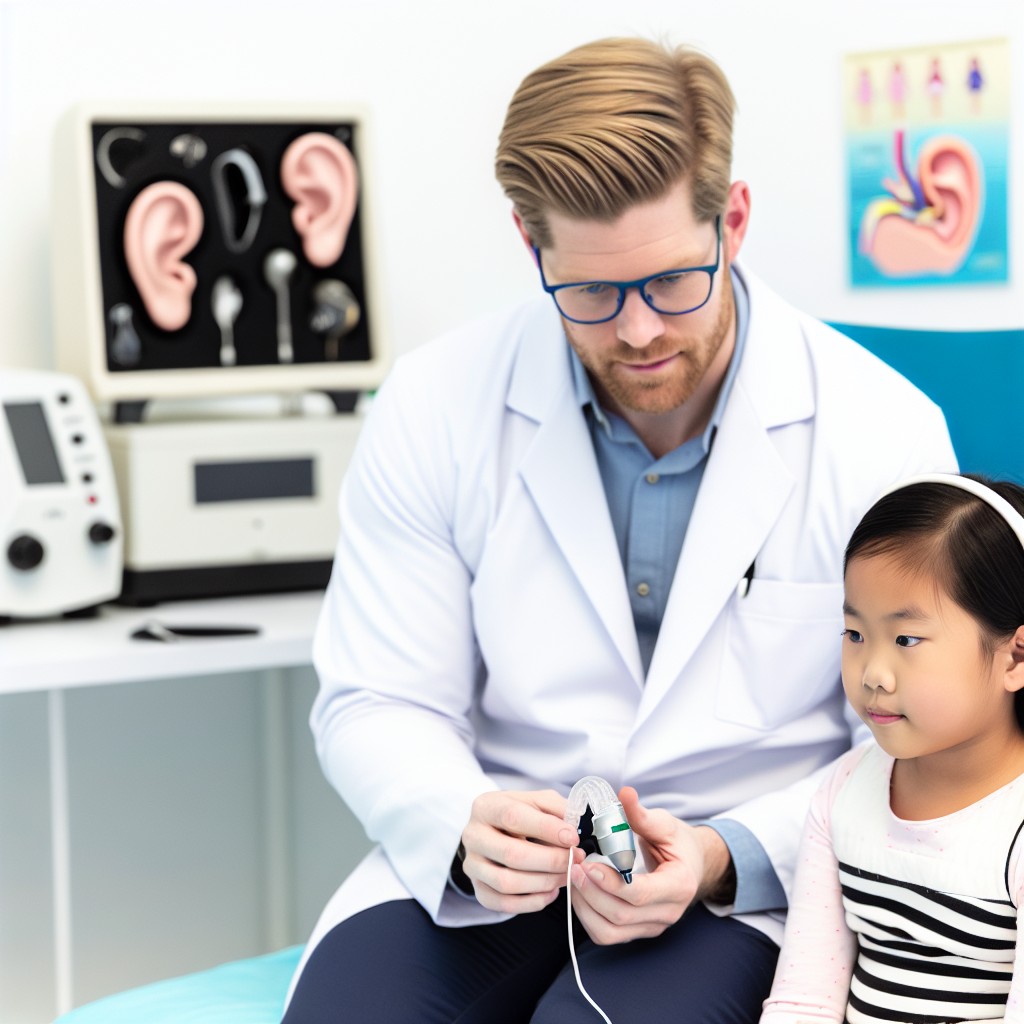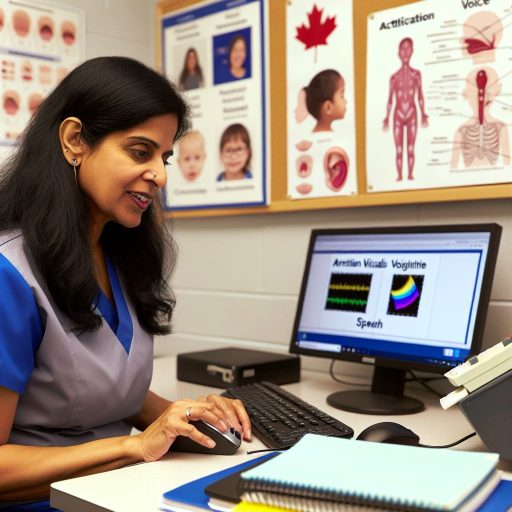Overview of Pediatric Audiology and Its Significance
Understanding Pediatric Audiology
Pediatric audiology focuses on hearing health in children.
This specialized field addresses various auditory issues.
Parents often seek audiologists to understand their child’s hearing capabilities.
Early diagnosis plays a crucial role in effective treatment.
Children encounter unique challenges related to hearing.
These challenges can impact their communication and learning.
The Role of Audiologists in Children’s Lives
Audiologists conduct comprehensive assessments of hearing abilities.
They use advanced technology for precise evaluations.
Moreover, they provide hearing aids and fitting services.
Audiologists also offer guidance on managing hearing loss.
Additionally, they work closely with families to support children.
Impact on Development
Hearing is essential for social and academic growth in children.
Delays in hearing can adversely affect language development.
Children with untreated hearing loss may struggle academically.
Timely intervention fosters better outcomes in communication skills.
Furthermore, it promotes confidence and socialization among peers.
Importance of Early Screening
Routine hearing checks are vital for infants and toddlers.
These screenings help identify potential issues early on.
Subsequently, early detection improves the chances of successful treatment.
Parents should ensure regular audiology appointments for their children.
Resources are available to assist families in understanding hearing health.
Collaboration with Other Professionals
Audiologists often collaborate with other healthcare providers.
Working with pediatricians enhances comprehensive care.
They also engage with speech-language therapists when needed.
This teamwork ensures holistic support for children with hearing loss.
Unlock Your Career Potential
Visualize a clear path to success with our tailored Career Consulting service. Personalized insights in just 1-3 days.
Get StartedUltimately, it leads to better health outcomes for children.
Role of Audiologists in Early Detection of Hearing Loss in Children
Understanding Hearing Loss
Hearing loss can significantly affect a child’s development.
It often leads to communication challenges, impacting social interactions.
Moreover, it can hinder academic performance and self-esteem.
Why Early Detection Matters
Early detection of hearing loss is crucial for optimal development.
Identifying issues early allows for timely intervention.
Research indicates that early treatment improves communication skills.
Ultimately, this enhances overall quality of life for children.
The Role of Audiologists
Audiologists are specialized professionals dedicated to hearing health.
They conduct comprehensive hearing assessments for children.
Using advanced technology, they identify hearing impairments quickly.
Additionally, they provide guidance on suitable treatment options.
Screening Programs
Many hospitals implement newborn hearing screening programs.
These programs detect potential hearing loss immediately after birth.
Follow-up audiological assessments strengthen early detection efforts.
Collaborative Care
Audiologists work collaboratively with pediatricians and educators.
This multidisciplinary approach ensures comprehensive care.
They share valuable insights to tailor educational strategies for affected children.
Advocacy and Education
Audiologists also serve as advocates for families.
They provide education about hearing health and available resources.
Furthermore, they empower families to make informed decisions about care.
The Impact of Effective Hearing Management
Audiologists play a vital role in pediatric care.
Their expertise in early detection shapes a child’s future positively.
Effective hearing management fosters better communication and learning opportunities.
Benefits of Audiological Assessments for Speech and Language Development
Identifying Hearing Issues Early
Early detection of hearing issues significantly impacts a child’s speech development.
Audiologists conduct thorough assessments to identify potential hearing loss.
Identifying hearing loss early allows for timely intervention and support.
This proactive approach encourages better communication skills as children grow.
Improving Speech Clarity
Audiological assessments help tailor speech therapy to a child’s specific needs.
Understanding a child’s hearing capability informs personalized therapy sessions.
With the right support, children can achieve clearer speech and language skills.
Consistent auditory input improves their ability to articulate sounds effectively.
Enhancing Language Acquisition
Good hearing is fundamental for effective language learning.
Audiologists aid in developing strategies that enhance language acquisition.
These strategies align with individual auditory processing abilities.
With proper intervention, children develop a richer vocabulary and grammar skills.
Boosting Social Skills
Effective communication is essential for social interactions.
Audiological assessments contribute to improving children’s interpersonal skills.
As communication improves, children’s confidence in social settings grows.
This increased confidence fosters healthier relationships with peers.
Supporting Academic Success
Hearing plays a crucial role in academic performance.
Audiologists enable children to engage fully in classroom activities.
Improved listening skills boost reading comprehension and overall learning.
Academic success becomes more attainable with properly assessed hearing abilities.
Providing Family Guidance
Audiologists offer valuable resources and guidance to families.
Families learn how to support their child’s speech and language development.
Parental involvement is critical for reinforcing the skills learned during therapy.
With proper education, families can create a nurturing communicative environment.
See Related Content: Building Client Relationships As A Speech Pathologist
Strategies Audiologists Use for Managing Auditory Processing Disorders in Children
Creating Individualized Treatment Plans
Audiologists assess each child’s unique needs when developing treatment plans.
They incorporate specific assessments to determine the type and extent of the disorder.
Next, they devise tailored strategies to address deficits in auditory processing.
Collaboration with parents and educators is crucial during this phase.
They ensure that these stakeholders understand the child’s specific challenges.
Implementing Therapy Techniques
Audiologists employ various therapy techniques to enhance auditory skills.
For example, they may use auditory discrimination exercises.
These activities help children differentiate between similar sounds.
Another technique involves speech-language therapy for improving understanding.
Additionally, they might incorporate music therapy to make learning enjoyable.
Utilizing Technology and Tools
Modern audiology incorporates technology to assist auditory processing disorders.
Audiologists often recommend assistive listening devices.
These devices help children focus on specific sounds in noisy environments.
Furthermore, they use auditory training software to reinforce learning skills.
Such tools create an interactive environment for improvement.
Involving Parents and Educators
Parent and educator involvement is essential for effective management.
Audiologists provide resources and training to both parties.
This education helps them support the child’s progress at home and school.
Regular communication between all parties fosters a consistent approach.
Moreover, involving parents encourages reinforcement of strategies in daily activities.
Monitoring and Adjusting Progress
Ongoing monitoring of each child’s progress is vital to successful outcomes.
Audiologists regularly assess improvements and difficulties during sessions.
They adjust treatment plans based on these evaluations to optimize results.
This flexibility ensures that strategies remain effective over time.
Ultimately, their goal is to enhance the child’s overall communication abilities.
You Might Also Like: How Speech Pathologists Support Mental Health Initiatives
Importance of Family-Centered Care in Pediatric Audiology Practices
Defining Family-Centered Care
Family-centered care places families at the heart of health care decisions.
This approach recognizes the essential role families play in a child’s development.
Moreover, it encourages active participation from family members in care processes.
Enhancing Communication
Effective communication is vital in pediatric audiology.
Audiologists must engage with both children and their families.
This engagement fosters trust and understanding of hearing health.
Additionally, it helps clarify treatment options and outcomes.
Building Stronger Relationships
Family-centered care nurtures stronger relationships between audiologists and families.
Families feel more valued and understood throughout the care journey.
These strong relationships lead to better collaboration and teamwork.
Consequently, families are more likely to follow through with recommendations.
Individualizing Care
Every child is unique, requiring tailored approaches in treatment.
Family-centered care allows audiologists to personalize audiological interventions.
This personalization considers the child’s specific needs and family context.
As a result, children’s varied responses to treatment improve significantly.
Supporting Emotional Well-Being
Pediatric audiology can be an emotional journey for families.
By valuing family input, audiologists can provide emotional support.
This support alleviates anxiety and fosters a positive atmosphere.
In turn, this promotes resilience in both children and their families.
Improving Treatment Outcomes
Research shows family-centered care improves pediatric health outcomes.
Engaged families are more likely to adhere to treatment plans.
Furthermore, children’s developmental milestones often see positive advancements.
Ultimately, this approach contributes to overall well-being and progress.
Delve into the Subject: Speech Therapy Techniques Used By Professionals

Collaboration Between Audiologists and Other Healthcare Professionals for Holistic Pediatric Care
The Role of Audiologists
Audiologists are crucial in pediatric care teams.
They assess children’s hearing abilities accurately.
Moreover, they provide vital recommendations for treatments.
This collaborative approach enhances overall care.
Interdisciplinary Collaboration
Effective pediatric care requires teamwork.
Audiologists regularly collaborate with pediatricians.
This helps to address various health aspects.
Additionally, they work closely with speech therapists.
Together, they create tailored communication strategies.
Holistic Approaches to Treatment
Holistic treatment considers all pediatric needs.
Audiologists assess auditory, speech, and language needs.
This assessment informs comprehensive treatment plans.
Consequently, children receive well-rounded care.
Communication and Information Sharing
Communication among healthcare professionals is essential.
Audiologists share critical information about hearing health.
This information influences treatment strategies.
Furthermore, effective updates keep everyone informed.
Case Studies and Success Stories
Successful collaborations can yield positive outcomes.
For example, timely interventions can improve language skills.
In one case, a child’s speech abilities significantly improved.
This occurred after audiologists worked with speech therapists.
Such examples highlight the importance of teamwork.
Uncover the Details: Choosing The Right Chiropractor For Your Needs
Technological Advancements in Audiology Impacting Pediatric Care
Innovative Hearing Aids
Recent innovations have led to smaller, more powerful hearing aids.
These devices now include features like connectivity to smartphones.
Children can effortlessly connect their hearing aids to various applications.
This technology enhances their communication experiences in everyday scenarios.
Remote Audiology Services
Telehealth services have transformed how audiologists deliver care.
Parents can easily schedule virtual appointments for their children.
This approach increases accessibility for families in remote areas.
As a result, children receive timely evaluations without long trips.
Advanced Diagnostic Tools
New diagnostic technologies offer precise assessments of hearing abilities.
Auditory brainstem response testing is now more efficient than ever.
This method quickly identifies hearing issues in young children.
Early diagnosis plays a crucial role in effective intervention.
Interactive Learning Environments
Educational tools now integrate audiology with engaging methods for children.
Interactive software helps children learn about their hearing health.
Through gamification, kids can understand the importance of auditory care.
This approach fosters a positive attitude towards regular check-ups.
Collaboration with Other Professionals
Technologies enhance cooperation among healthcare providers.
Audiologists work closely with speech therapists and educators.
This teamwork ensures comprehensive care tailored to each child’s needs.
Such collaboration improves overall developmental outcomes for children.
Case Studies Showcasing Successful Interventions by Audiologists in Pediatric Settings
Improved Hearing in Young Children
The intervention of Dr. Sarah Jennings significantly improved hearing in a three-year-old named Emily.
Emily struggled with communication due to undiagnosed hearing loss.
Dr. Jennings conducted comprehensive hearing assessments.
She fitted Emily with hearing aids tailored for her age and lifestyle.
Within months, Emily’s speech and social skills flourished.
This case exemplifies the critical role audiologists play in early intervention.
Support for Children with Auditory Processing Disorder
Jackson, a six-year-old, faced challenges with auditory processing.
He had difficulty following directions and understanding spoken language.
Therapist Dr. Martin Lutz designed a customized auditory training program.
This program incorporated interactive games and exercises.
After several sessions, Jackson showed remarkable progress.
His ability to process auditory information improved significantly.
This success highlights the importance of tailored audiology services.
Listening Therapy for Children with Hearing Loss
A local clinic treated Mia, a five-year-old diagnosed with moderate hearing loss.
Audiologist Rebecca Childs implemented a listening therapy program.
This included activities that encouraged sound recognition and speech development.
Mia participated twice a week, focusing on interactive and playful learning.
Her listening skills improved, aiding her academic development.
This success underscores the effectiveness of specialized audiological interventions.
Family Involvement in Audiological Care
The case of the Thompson family demonstrates the impact of family involvement.
Their son, Alex, was diagnosed with profound hearing loss.
Audiologist Dr. Emily Foster involved the family in the rehabilitation process.
She provided education on communication strategies and assistive devices.
Family support proved essential to Alex’s adjustment and success.
This scenario shows how collaboration enhances pediatric audiology outcomes.
Early Diagnosis and Intervention as Key Success Factors
Timothy, a newborn, underwent hearing screening shortly after birth.
Audiologist Mia Chen detected bilateral hearing loss promptly.
She facilitated early intervention before Timothy reached six months of age.
His family received guidance on hearing aids and speech therapy options.
Timothy’s early access to resources set a solid foundation for his development.
This case reinforces the importance of early diagnosis in pediatric audiology.
Additional Resources
Barriers to Equity in Pediatric Hearing Health Care: A Review of the …
Striking the Right Balance: The Importance of Screening for …




